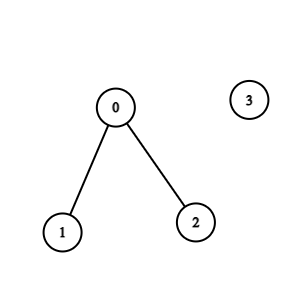Problem
There is a **bi-directional **graph with n vertices, where each vertex is labeled from 0 to n - 1. The edges in the graph are represented by a given 2D integer array edges, where edges[i] = [ui, vi] denotes an edge between vertex ui and vertex vi. Every vertex pair is connected by at most one edge, and no vertex has an edge to itself.
Return **the length of the **shortest cycle in the graph. If no cycle exists, return -1.
A cycle is a path that starts and ends at the same node, and each edge in the path is used only once.
Example 1:

Input: n = 7, edges = [[0,1],[1,2],[2,0],[3,4],[4,5],[5,6],[6,3]]
Output: 3
Explanation: The cycle with the smallest length is : 0 -> 1 -> 2 -> 0
Example 2:

Input: n = 4, edges = [[0,1],[0,2]]
Output: -1
Explanation: There are no cycles in this graph.
Constraints:
2 <= n <= 10001 <= edges.length <= 1000edges[i].length == 20 <= ui, vi < nui != vi- There are no repeated edges.
Solution (Java)
class Solution {
public int findShortestCycle(int n, int[][] edges) {
List<Integer>[] adj = new List[n];
for (int i = 0; i < n; i++) {
adj[i] = new ArrayList<>();
}
for (int[] edge : edges) {
int u = edge[0];
int v = edge[1];
adj[u].add(v);
adj[v].add(u);
}
int minCycle = Integer.MAX_VALUE;
for (int i = 0; i < n; i++) {
int[] dist = new int[n];
Arrays.fill(dist, -1);
Queue<Integer> queue = new LinkedList<>();
queue.offer(i);
dist[i] = 0;
while (!queue.isEmpty()) {
int u = queue.poll();
for (int v : adj[u]) {
if (dist[v] == -1) {
dist[v] = dist[u] + 1;
queue.offer(v);
} else if (v != i && dist[v] >= dist[u]) {
minCycle = Math.min(minCycle, dist[u] + dist[v] + 1);
}
}
}
}
return minCycle == Integer.MAX_VALUE ? -1 : minCycle;
}
}
Explain:
nope.
Complexity:
- Time complexity : O(n).
- Space complexity : O(n).